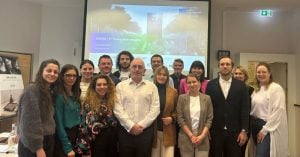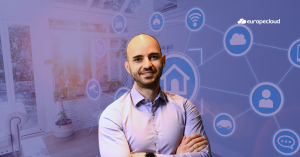Many successful startups have sprung from hackathons and there are abundant examples of such stories in the SEE region such as the Greek web-based eye-tracking startup that provides insights to brands and marketers Loceye. Combining the growth potential that hackathons provide to participants with the innovative bold talent of universities, brings an extended value and allows for the development of even more creative tech solutions.
Founded by two students from the American University in Bulgaria who later became the co-founders of Centroida – the software development startup, acquired by ScaleFocus, The Hub AUBG is a community of tech-savvy and entrepreneurially- minded students with a mission to accelerate the exchange of ideas in software development, engineering, technology, and design. Since 2016, the club has been organizing annual 3-day-long programming hackathons for university and high-school teams to help them with the support of mentors to create a profitable IT solution along a common theme.
HackAUBG 3.0: Focus on smart city innovations
This year’s HackAUBG took place in the last days of February in an online format and challenged its 58 participants, divided into 14 teams, to put their programming skills and creative thinking to come up with solutions for the common theme of “Smart Cities”. The event sparked regional interest and among participants, there was a Romanian team and a mixed Bulgarian-german team, as well as North Macedonians, Albanians, and students from Sofia, Plovdiv, and Stara Zagora. The teams were mentored by software engineers and data scientists from Musala Soft, Amplify, ScaleFocus, Uber, and Astea Solutions, while the panel of judges included Ekaterina Marinova, who is a Data and Innovation Strategist at Raiffeisenbank Bulgaria, and Hristo Georgiev who is one of the co-founders of Centroida and the Hub AUBG. The code that the teams developed was judged according to the complexity of the algorithms used, the project interface design, the tech stack, and its scalability, while the business plan of the project was judged according to its originality and profitability.
AI crowd dynamics, smarter utility expenditure, and ML parking solutions
The solution of the winning team, which was awarded €1K, is a crowd dynamics and city management platform that aims to provide citizens and municipal authorities with insights into the distribution of people in a city. Their GeoShare system aimed to address the lack of in-depth information regarding larger gatherings of people, which causes delays and prevents city authorities from responding in a timely manner. By using location-based data collected through a mobile app, GeoShare will be able to provide its users with AI-based alerts, notifications, recommendations, and summaries regarding the crowd dynamics in their cities. Their solutions also envision using the collected data and give it to municipalities to enable them to better evaluate the behavior of the population. In order to ensure the privacy of its users, GeoShare plans to encrypt the data and keep users’ identities hidden. One of the members of the team that created the AI crowd dynamics solution was Radostin Cholakov – a 15-year-old high school student who had been awarded by Google and currently works on the development of an ML natural language processing platform with a focus on the Bulgarian language and alphabet.
The second team developed the platform Udoma, which uses big data to give advice on smarter utility expenditure and help its users save more money while using fewer resources. The platform aims to increase the energy efficiency awareness of people and envisions using a real-time comparison of utility bills and point out potential problem areas that cause higher bills and waste resources. And the third winning team developed Parkinc – an ML software that detects vacant parking spaces and sends users notifications and information about parking lot capacities.







